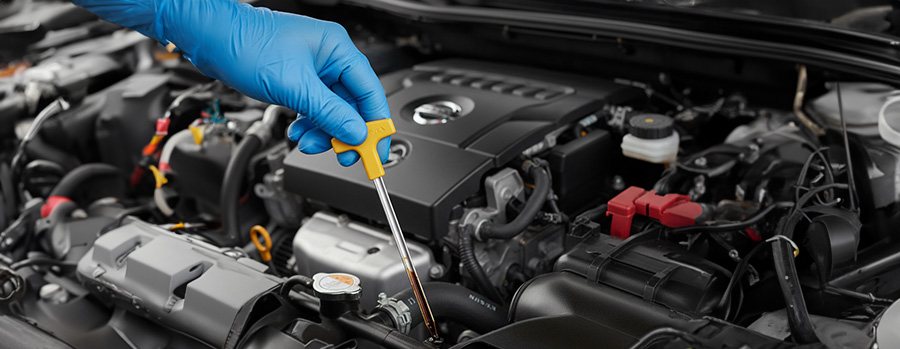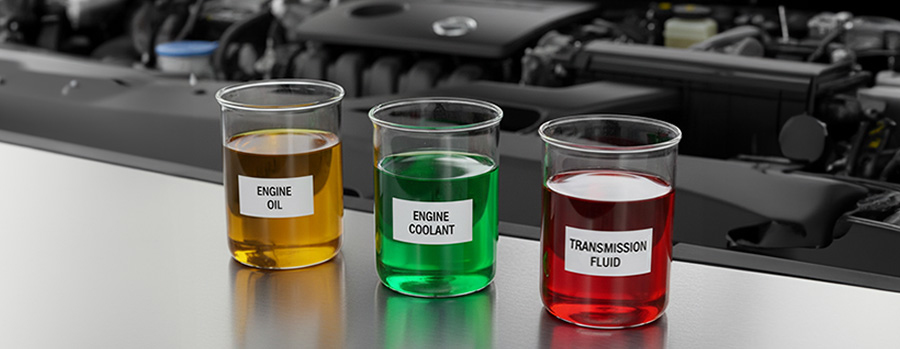03 November 2025Running your car without checking its fluids is like deciding to run cross country without drinking a drop of water. The first few miles? Fine... but eventually, you’ll start to see things breaking down. Muscles cramp, energy fades and in your Nissan’s case, engines overheat, gears slip and blown brakes.
And here in Vero Beach, where the sun beats down and salty air adds extra wear, your vehicle works even harder. That’s why fluid maintenance isn’t just a good habit; it’s essential.
From engine oil to brake fluid, these vital liquids keep your Nissan cool, smooth, and safe. In this guide, we’ll walk you through the key fluids your vehicle depends on, how to check them, and why staying on top of them can mean the difference between a smooth ride and a costly breakdown.
The Core Trio: Engine Oil, Coolant, and Transmission Fluid
Your Nissan's heart beats with engine oil, coolant, and transmission fluid. Low levels in any can spell big trouble, like overheating or gear slips. Regular top-offs prevent these issues and save you cash down the road.
Oil lubes the engine, coolant fights heat, and transmission fluid keeps shifts smooth. Skip checks, and you risk breakdowns that no mechanic fix can prevent easily.
Engine Oil: Lubrication and Thermal Regulation
Engine oil coats moving parts to cut friction and wear. It also pulls heat away from hot spots inside the motor. Without enough, metal grinds on metal, leading to early failure.
Nissan often calls for synthetic oil in models like the Altima or Rogue for better protection. Check your owner's guide for the right type, like 0W-20 viscosity. Conventional oil works in older cars, but synthetics last longer in tough conditions.
To check, park on level ground and wait 10 minutes after shutdown. Pull the dipstick, wipe it clean, and dip again. Look for oil between the low and full marks, dark is okay, but milky
means water mix, and thin oil signals trouble.
- Tip 1: Change oil every 5,000 miles or as Nissan says.
- Tip 2: If low, add the right type slowly; don't overfill.
- Tip 3: Watch for smoke from the tailpipe as a low-oil sign.
This simple habit boosts your Nissan's engine life by years.
Engine Coolant/Antifreeze: Preventing Overheating and Corrosion
Coolant (also called antifreeze) keeps your car’s engine from getting too hot by carrying heat away to the radiator. It also helps prevent rust inside the engine and pipes.
If the coolant level gets too low, air can get trapped in the system. That makes the engine heat up faster and can damage important parts.
You might notice signs like the temperature gauge going up, or a sweet smell coming from under the hood, coolant contains a chemical called ethylene glycol (or sometimes propylene glycol), which has a distinctly sweet, syrupy odor, kind of like maple syrup or candy or puddles of colored liquid under the car. Always check the coolant tank when the engine is cold, and make sure the fluid is at the "Full” mark.
If your Nissan gets hot when you’re stuck in traffic, it’s often because the coolant is low. Just topping it up can prevent overheating and save you from major repair headaches later.
Transmission Fluid: Smooth Shifting and Gear Protection
Transmission fluid keeps your car’s gears running smoothly by lubricating moving parts and helping the system shift properly. It also cools the transmission during heavy driving.
In manual cars, the fluid mainly provides lubrication, but using the correct grade is crucial for protecting the gears.
For Nissan vehicles with CVT (Continuously Variable Transmission)—like the Sentra—only NS-2 or NS-3 grade fluid should be used. The wrong fluid can cause serious problems, including slipping or damage to the transmission belts.
You can top off transmission fluid yourself if you know where the dipstick is, but complete fluid changes are best left to professionals.
To check the fluid, the engine should be hot and running, with the car in Park. The fluid should appear bright red and clean, not dark or burnt smelling. If it’s low, you might feel hard shifts or hear unusual noises. Top off slowly to avoid trapping air bubbles.
Braking and Steering Systems: Safety-Critical Fluids
Brakes and steering fluids tie straight to your safety on the road. Low brake fluid means weak stops, while steering woes make turns into a fight. Inspect these often to stay in control.
These aren't quick top offs like oil. They need checks for leaks or wear. After brake jobs, levels drop, top off then but flush every two years per Nissan.
Brake Fluid Integrity and Moisture Contamination
Brake fluid is the crucial medium that translates the force from your pedal into the clamping power at the wheels.
The problem is that brake fluid is hygroscopic, meaning it naturally absorbs moisture (water) from the air over time. This absorbed water is highly dangerous because it has a low boiling point.
When you brake heavily or repeatedly, the friction creates immense heat. If the fluid contains too much water, the water can boil inside the brake lines, creating steam vapour bubbles. Unlike fluid, vapour is compressible. When you press the pedal, the force compresses the bubble instead of pushing the pads, resulting in a sudden and dangerous loss of braking power known as brake fade or vapour lock, especially on long descents.
Be sure that you look out for:
- Warning Signs: Dashboard light on, or pedal sinks to the floor.
- Quick Check: Do it monthly, especially before trips.
- Pro Tip: Flush fluid when over 30,000 miles for safe stops.
Power Steering Fluid Checks (Hydraulic Systems Only)
In older Nissans like some Frontiers, hydraulic fluid eases wheel turns. Low levels cause whine from the pump or stiff steering at low speeds.
Newer models, like the 2023 Armada, use electric power steering—no fluid needed. Check your setup in the manual. For hydraulics, look at the reservoir dipstick; add if below low.
Symptoms hit quick: heavy wheel or fluid spots under the car. A top-off quiets the noise and smooths the drive. But if it leaks often, see a shop for seals.
Think of it as oil for your wheel muscles, keep it full for easy handling.
Washer Fluid
Don't forget the side players: washer fluid for clear views and drivetrain oils for grip in mud. These top-offs seem small but matter in rain or off-road fun. Low washer fluid blinds you; empty diffs slip wheels.
Ancillary fluids round out maintenance for all Nissans. SUVs need extra care for AWD parts. Check them with oil for a full routine.
Consult Your Nissan Owner's Manual: The Definitive Guide
Before you turn to Google or a friend for advice, grab your Nissan owner’s manual, it already has every answer you need. From the right oil type to when to change your filters, it’s written specifically for your exact model and year, not a general guess.
Most drivers ignore it until there’s a problem, but those who read it save time, money, and headaches. The manual tells you what fluids to use, when to replace parts, and how often to check critical systems. Following it keeps your car running smoothly and protects your warranty.
Whether you drive a Titan, Altima, or Leaf, your manual is basically your car’s playbook. Read it once, and you’ll know your vehicle better than most mechanics do.
So, before you hit the road or schedule your next service, take five minutes with your manual. It’s the simplest way to make sure your Nissan stays healthy for the long haul.
Conclusion
Keeping up with your vehicle’s fluid checks is one of the easiest ways to protect your Nissan’s performance and reliability. From the oil that keeps your engine smooth to the brake fluid that ensures confident stops, every drop matters. A quick monthly check can prevent costly repairs and keep your car running like new.
When it’s time for a top-off or full service, trust the certified technicians at Nissan of Vero Beach. Our team knows your Nissan inside and out, using the right fluids and factory-approved procedures to keep it in peak condition.
Stay proactive, stay protected, schedule your next maintenance visit with Nissan of Vero Beach, and enjoy many more miles of smooth, worry-free driving.



